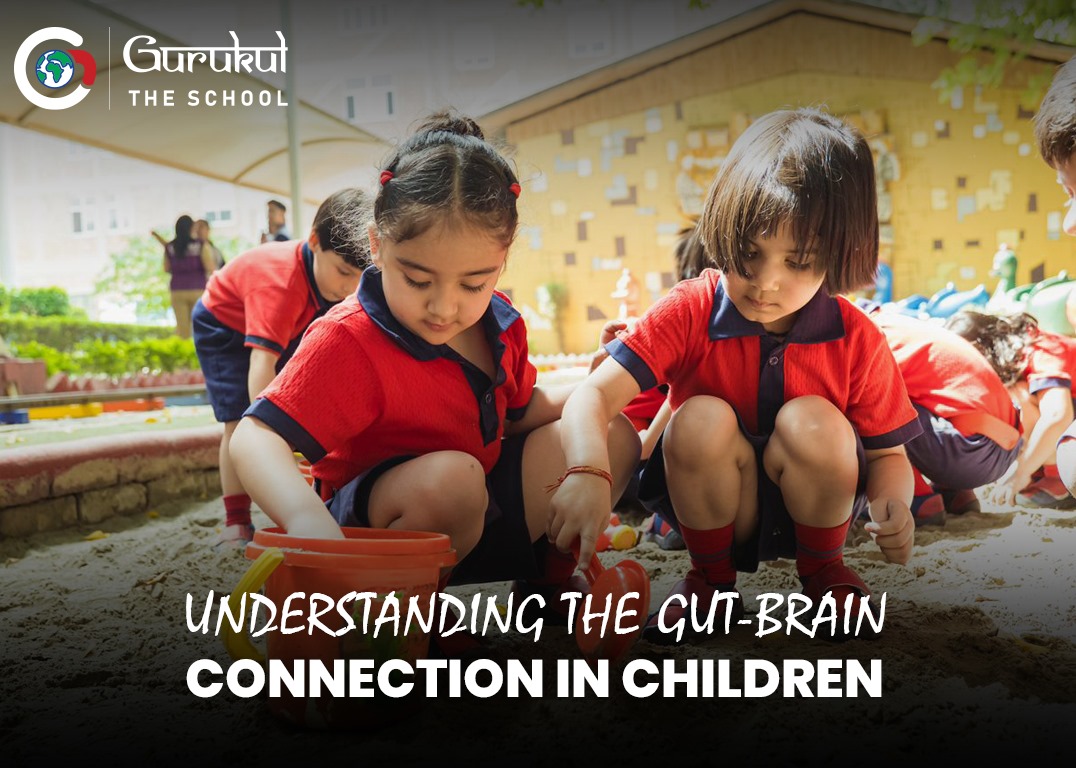Understanding the Gut-Brain Connection in Children
posted on Sep 20, 2024
Understanding the Gut-Brain Connection in Children

Parents often focus significantly on their kids’ diets, physical wellness, academic progress, and other visible metrics. Yet, they find it challenging to understand why their kids behave a certain way, eat specific food items, or feel particular emotions. Not many know, but it happens because of the gut-brain connection. You may not see it, but it controls a significant part of a person’s life, especially kids. The gut always communicates with the brain and vice versa, controlling different body functions, thereby impacting health as well as cognitive functions.
At Gurukul The School, ranked among the top 10 CBSE schools in Ghaziabad, we firmly believe that every parent must have a fundamental understanding of the gut-brain connection. This is necessary for them to be able to better contribute to their child’s holistic well-being and understand why their kids are behaving, feeling, functioning, etc., a certain way. Today, in this blog post, we will be discussing how gut health is connected with brain health and will also look at how this connection can influence your kids.
The Gut-Brain Connection – What Every Parent Must Know!
The gut-brain connection in children is of prime importance and can be best described as a complex and bidirectional communication system between the central nervous system and gastrointestinal tract. The gut and the brain communicate via numerous pathways, such as the vagus nerve, endocrine system, immune system, etc. Since the gut produces neurotransmitters that influence brain function, it is also called the second brain.
While the gut-brain connection develops in utero, it continues to evolve throughout childhood. Your child’s diet, stress levels, environmental exposure, and antibiotics significantly influence this connection during their formative years, shaping their overall health development.
How Does Gut-Brain Connection Influence Children?
Many parents have difficulty understanding how the gut-brain connection influences their children because it can be challenging to gauge with the naked eyes. Thus, in this blog post today, we at Gurukul The School have summed up its influences in simpler words to make it easier to understand for everyone. So, let’s explore how your child’s gut-brain axis is affecting them through the following points.
The gut produces a significant portion of serotonin, a.k.a. the happy hormone, a neurotransmitter crucial for mood regulation. If your child’s gut is imbalanced, their gut will release fewer serotonins, leading to mood swings, irritability, etc. The gut also produces other mood-regulating neurotransmitters, like dopamine, GABA, and others, controlling much of your child’s mood.
The easiest way to improve your child’s gut and mood regulation ability is by giving them a balanced diet high in prebiotics and probiotics. If your child experiences frequent irritation and intense mood swings, consider limiting their processed food intake and encourage them to exercise regularly.
The gut microbiome produces numerous biochemical compounds and neurotransmitters that directly influence your child’s brain function and behaviors. If your child’s gut microbiome is imbalanced, it will spike the production of cortisol and other stress hormones, potentially paving the way for anxiety, hyperactivity, and even aggressive behavior.
Your child’s gut-brain connection will determine how they react to various stimuli, so ensure it is always balanced. If you want your child’s stress response system to work properly and enhance their emotional regulation, you must begin prioritizing their diet with plenty of fiber-rich food. Encourage your kids to stick to consistent meal times for the best results.
-
Cognitive Function and Learning
Essential neurotransmitters and compounds are produced in children’s guts, directly influencing their memory, focus, problem-solving skills, and other cognitive functions. A healthy gut-brain axis always releases enough short-chain fatty acids for supporting brain health and cognitive functions. It will also facilitate neuroplasticity, which is crucial for a thriving learning journey.
If your child experiences an imbalanced gut microbiome, he or she will face issues like brain fog, inability to focus, and other learning challenges. We at Gurukul The School believe the best way to support your child’s cognitive function is by giving them a healthy diet rich in vegetables, fruits, and food items loaded with omega-3 fatty acids. Ensure kids get adequate sleep for optimal results.
-
Immune System Development
It might be surprising for many, but a significant portion of one’s immune system resides in the gut and is trained by the gut microbiome to respond to various stimuli. A healthy gut-brain axis will always support your child’s immune system by releasing more cytokines, regulating the development of T cells, and maintaining the integrity of the gut barrier.
An imbalanced gut-brain connection will often result in inflammation and significantly increase the risk of autoimmune disorders. If you want to strengthen your child’s immune system by supporting a healthy gut-brain axis, you must focus on their diet and regular physical activity.
Conclusion
The gut-brain axis is the most powerful system that controls every aspect of your child’s life. While this link may seem invisible, it profoundly influences your child’s cognitive functions, mood patterns, behavioral patterns, immune system, and much more. Hence, by means of this blog post today, we at Gurukul The School, being one of the top 10 CBSE schools in Ghaziabad, would like to urge all parents to focus on nurturing a healthy gut-brain connection in your kids by promoting a more holistic approach to life. You can begin by improving their diet, making them allocate more time for physical activities, and ensuring they get enough sleep.